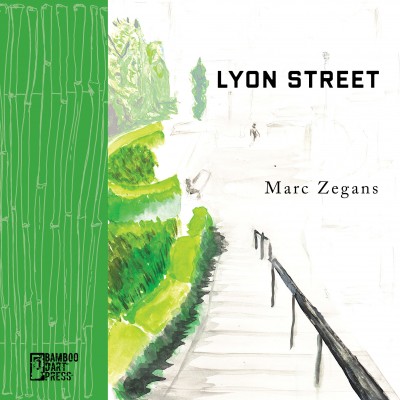 Reviewed by Ed McManis
Reviewed by Ed McManis
Lyon Street
by Marc Zegans
Bamboo Dart Press
September 2022, $8.99, Paperback, 56 pages, ISBN-13: 978-1947240612
In Lyon Street, Marc Zegans, poet, spoken word artist, mentor, shares his latest collection of poems. Zegans, like a grizzled but proud tour guide, takes us through (complete with map) his special ‘hood, his corner of San Francisco where he sharpened his writing skills and matured in the shadow of the Beats. With a lyric, warm, and sometimes edgy voice, Zegans delivers love letters, and connects Beat poetry, jazz, memories of Art Blakey and Ferlinghetti, the deep Pacific, San Francisco’s cafes, restaurants, and its literary pearl, City Lights.
The first, spare poem, “Rigidity” sets the stage, if you will, with “Jay” high on a hill in a bare room, “…facing empty glass” the image of curling, musical notes and “lines/falling.” One gets the sense of music played and composed in solitary, no audience, the artist staring out past the saxophone into all that is beyond.
“Less Thank Burlesque” then transports us into the gritty part of the city, unfolds at the Condor, with its dancers, “…before Reagan and the coming of AIDS,” (interesting juxtaposition) and we see Carol Doda “…descend from the ceiling/atop a chipped white baby grand piano//and spin her tassels, crazy propellers,/in opposite directions….”
For our poet, each of the women who appear in this collection are more than characters. Each one is also an encounter to be reckoned with, an archetype, someone to be understood at a deeper level. The poem concludes with the poet wondering if this “carnival life” was “…a perfect faith that this was forever..” until he and company then “…ambled across Broadway down Columbus…climbed the secret stairs to Apple and Eve,// saw the dancing girl with the welts on her thighs,/ and realized, all this was not just play.”
Young, spontaneous adventure gives way to the starker humanity beneath. In “Unclasped”, we have another relationship, the author taking a woman into the ocean’s, deeper waters.
I took your hand in the hollow between
two curls and led you to deeper waters.
You looked back to shore, scanning for your boy
a thin line of love tethering you to shore.
By the end of the collection we recognize this motif of turbulent surf, deep waters, even “the thin line of love” which is the author’s tenuous connection to his young loves, the untethered, sometimes reckless young poet.., the “thin line” an easy morph into the lines of these poems, mirroring the notes and lines that fell from our solitary musician in “Rigidity.”
In a number of poems, the places themselves—cafes, restaurants—become the characters. In “SOLSTICE” the poet, now drinking soda-water and lime, (one has to smile and wonder at that story of sobriety) recalls the place “…where double whiskeys/ flew down my throat, poured sloppy/ and delivered free by the waitress….” The poem concludes with the ironic epiphany:
…we had changed
places Solstice and I. She was clean/
and bright and slick and new, and I’d
become the trusty old rough and scuffed
place of my youth, carrying now with me
what I once needed place to establish.
“Pressed Tin” takes us to one of the most celebrated, famous/infamous, over-hyped and under-utilized bookstore, the Columbus landmark, City Lights. (The “Woodstock” of bookstores; everyone’s been there, right!) City Lights, where the Beat generation centered its spotlight on Ginsberg, and Ferlinghetti kept the campfire coals smoldering nigh up until his hundredth birthday.
We enter past “Tired Tibetan flags, hang limp/dusty, dirty, thin threads unraveled…” proceed to the fire escape, an egress, stare out and “…spot the slim/alley-edge sign of Vesuvio below,/and having been confused by the turn/in the stair, you are now situated in the/ roost.” Here our author sits back and imagines “…when this room of Ferlinghetti’s/was at the center of things…”
The Beat ouvre is visited again in “P(un)k Poets Too Fucked to Drink” where the poet admonishes us that there must be a shift from the shadow of the Beats “…demand/Williams/not Whitman/” and we are asked, “Is it our work now to surrender long lines, to howl no more….” The poem concludes with the poet wistfully arriving at the responsible, even mundane realization that “This time, it is on us. The times demand/nothing, but what will we demand of ourselves?” One senses that time, the ultimate and final editor, has transformed Zegans howl and yawp into a more introspective, empathetic, deeper voice.
We see this in “Final Impression of a Dying Man” where the author says goodbye to a friend, who’s been on the decline for some time.
Thoracic spine, crustacean curled,
each vertebra distinct, popping back,
… When I touch your back,
all I feel is bone and sadness.
Our author says his good-byes “…and the room fills with storm grey.”
If you know San Francisco, you’ll be tapping along in time as Zegans sings his song, speaks his truth, weaves his lines, remembers and dis-remembers the days of his youth, the lessons learned and those that were missed. And even if you’re new to San Francisco, just a tourist, Lyon Street is a wonderful guide as you dip your sourdough into your clam chowder and “…survey the distant black/Taste the salt/And start to swim.”
About the reviewer: Ed McManis runs McMania Publishing. His work has appeared in more than 50 pubications.